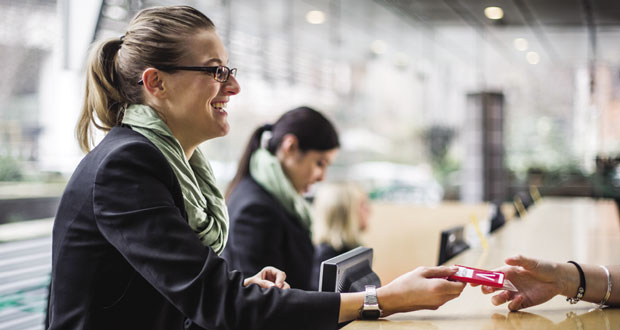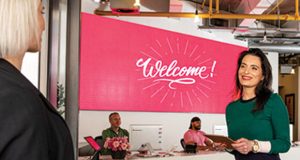VIRTUAL VRS REALITY
Digital solutions for FoH services have been evolving over the years and the pandemic has only escalated the process by allowing employees and guests to self-check in to help support social distancing. For example, at Mitie’s Head Office in The Shard, a virtual receptionist ‘Gloria’ allows colleagues that are familiar with the new COVID processes to check themselves in. With Gloria supporting frequent visitors, front of house colleagues can have more time to focus on explaining the COVID solutions and procedures in place and answer questions for any new visitors.
Angelico of On Verve also believes that digital technology will also enable integration with other facilities services, i.e. supporting temperature checks, connecting with security gate systems, and giving employees access to different parts of the workplace.
She says: “Scheduling systems have also been around for some time and will grow in popularity. Now it’s not just about booking rooms or desks, it’s about visibility of who’s in the office to ensure employees won’t be alone in the office or unable to connect with team members. Everything being scheduled helps with booking AV, catering, and cleaning schedules to ensure safety and a seamless experience in the workplace.”
According to Pritchard of Moneypenny, there’s now a huge amount of technology available to speed up and make the physical ‘check in’ experience more efficient for visitors, such as contactless video concierge. Alongside this, asset management systems can allocate parking spaces, meeting rooms, desks and refreshments seamlessly. But she says, “technology will never replace the importance of the personal touch. For us, technology and people must have a symbiotic relationship.”
Cooper of SmartSec argues that from a wellbeing and mental health perspective, you can’t put a price on actually seeing and speaking to someone.
“We are lucky that our front of house staff are seen as part of our clients’ teams. The office experience goes way beyond collaborating with colleagues. It’s picking up your takeaway coffee on the way in to work, it’s acknowledging the regular commuter you see most mornings, and it’s also the conversations you have with front of house staff.”
SOCIAL ENGAGEMENT
If, as has been predicted the workplace moves towards being more of a destination place, for a social, team building experience, the front of house offering will need to emulate a hotelier’s concierge/reception environment. Cummins of Mitie says this is a trend which has been developing over recent years as employers focus on creating workplaces that promote employee safety and wellbeing.
She says: “This has resulted in front of house teams going beyond their traditional tasks – booking meeting rooms and welcoming customers to taking responsibility for managing new activities, such as mindfulness and yoga classes. As more businesses move to a hybrid model of working, we expect front of house colleagues to play an even bigger role helping deliver wellbeing initiatives for colleagues with flexible working schedules.”
For Pritchard, a more agile workplace means more people coming and going, with some people very familiar with things such as the technology, facilities and etiquette, but others less so, making that concierge offering even more important.
 “Hybrid working makes employees become visitors themselves. Issues with accessing Wi-Fi, how to book spaces, organising lunch, where to access IT help and how to locate other visiting colleagues will be best resolved with a central point of contact. FoH teams are well placed to do this, and I see their contribution only growing in importance and value. FoH professionals will be integral to the employee and client experience and will embody an organisation’s culture.”
“Hybrid working makes employees become visitors themselves. Issues with accessing Wi-Fi, how to book spaces, organising lunch, where to access IT help and how to locate other visiting colleagues will be best resolved with a central point of contact. FoH teams are well placed to do this, and I see their contribution only growing in importance and value. FoH professionals will be integral to the employee and client experience and will embody an organisation’s culture.”
Taking a hotelier approach adds Hiner that: “FoH can become a friendly source of knowledge on a range of social aspects; from travel plans and weather challenges to the latest pub and restaurant reviews and offers, even a guide to what is happening in their postcode and special offers from local retailers and food outlets.”
But Angelico thinks the workplace will need to provide more than just a hotel experience to service a mix of employees / guests working in the office or virtually anywhere else, home, coffee shops or travel hubs.
“I believe we need inspiration from other industries that are going through similar experience while [still] delivering phenomenal service, such as the fitness industry. I think the future of front of house is about creating energy in the workplace and helping to support our clients by building one community. No matter where you work, you get the same support as if you were in the office.
“We need to go beyond offering to emulate a hotelier’s concierge/reception environment. By this I mean focussing on the characteristics of the different demographics of the building users. A hotelier approach offers one type of service but in my opinion the modern workplace FoH teams should deliver services that connects at all levels and that means looking broader and going outside traditional approaches.”
FUTURE OF FOH
The SPS research suggests a boom in front of house services over the coming months, with the majority (91 per cent) of businesses saying the way they manage front of house services will change as a result of the crisis and 95 per cent stating their entire strategy has been impacted.
Jess Prichard predicts this boom will extend from the use of new front of house software tools to outsourced partnerships and aligned FM technologies.
“Knowing where staff are to transfer calls, improving the client experience and making sure all systems support hybrid working (for clients’ and employees’ benefit) will present a new set of considerations for FMs and their FoH teams,” she says.
Hiner believes that with some offices seeing higher volumes of workers for longer hours on certain days and on other days an almost skeletal occupancy, outsourcing solutions help ensure a high quality of FoH service every single day.
For Cooper there is also the question of servicing the growing number of start-ups that shot up throughout the pandemic. She says: “These businesses will soon need office space, even if it is shared co-working facilities. That’s exactly who I believe will be occupying the floors that have been left behind by large corporates who have embraced the hybrid working model.”
While for the moment, the prime purpose of FoH is on welcoming employees back, as we come further out of the pandemic and confidence in workplace safety grows, the focus will mature to ensuring that employees and guests have the best possible workplace experience.
As Angelico suggests organisations will rely on: “Having a community host who is present to help solve problems and make things happen; they can get under the skin of the business culture, getting to know the people and using that insight to learn how to make their day.”





